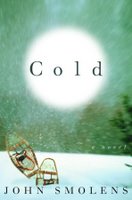John shared some of his thoughts about the novel that I only briefly touched on and I wanted to share them here.
On the role of
 the blizzard and severe weather in the novel:
the blizzard and severe weather in the novel:Weather and climate are extremely important in this book. A friend wrote to me and said he thought the blizzard was the main character of the story. I believe we learn much about how the world “works” through observing natural phenomena. The study of the elements, of animal behavior, the stars, they all contribute to our sense of order. The Upper Peninsula of Michigan is one of those places where the climate is often extreme. The blizzard, the wind, the snow, the cold are not exaggerated in this novel; winters are like that…. If you live in that kind of environment for years …, you can’t help but be influenced by it.On the relationship of the cold weather to the warmth/cold in hearts of several of the characters:
[T]his seems to be behind much of the story. I was pleased and relieved when I wrote the final scene, where Liesl and Del are together, caring for Noel’s little girl. And then Liesl hears the bear in the woods. She doesn’t really see the bear but she senses it. The bear is important in this novel; it’s the true creature of the north. Wanting to see a bear in the woods is an act of hope. This scene is full of love, enough, I hope, to compensate for so little in the rest of the book.On the origin of the idea for the story:
On writing fiction:We moved to Marquette, Michigan, here in the Upper Peninsula five years ago (the winter the new snowfall record was set!). I teach English and direct our Master of Fine Arts program at Northern Michigan University. When I first got here, I learned that there was a prison in the woods outside of town, which was built in the middle 1800s. There's one history that's been written about the place, which I read that first winter; and there's many stories that locals tell. The unusual thing about this prison is not the number of attempted escapes that have taken place over the years, but how frequently escapees have turned themselves in. This is due to the climate. They get cold, they get lost in the woods, and in many instances they've eventually found their way into a small town and asked to be taken into custody.
And then there's the local term "walkaway." A walkaway is a prisoner who does just that: simply walks away from some work detail. This has happened often over the years, though recently the prison has constructed more fences to insure that it won't happen in the future. A sailing friend of mine, Lars Weyer, is a retired prison guard, and he has helped me develop some understanding of how the prison is run. The prisoners are classified according to the crimes they were convicted of; and Norman Haas is what is known as a "trustee." Historically, trustees have considerable freedom of movement about the prison, and they are often taken out to work on roads at other public sites. It's quite conceivable that Norman might just walk away from prison in a blizzard. What makes him different is that he has the determination, fortitude, and luck to make his way home. I began Cold with Norman emerging from the woods in heavy snow. I knew he was being observed by someone in a small house—I didn't know who. And that's when I met Liesl Tiomenen.
I can't really explain what attracted me to writing fiction. In fact, I wasn't much of a reader until my late teens. I know many writers claim they knew they were going to write from the age of three, but as a child I was too busy playing baseball or hockey or just getting dirty to read a book. When asked why he wrote, John Updike's response was "Why not?" For me, life would seem empty if I weren't thinking about what a character might find if she walked through the door unexpectedly. Writers lead a double life—their own, plus the one the puts stories on paper. I think of a story, a character, a scene, a sentence as a gift. We are granted only so many such gifts. They may first come to us in a rather rough state, but then it's our responsibility to work and rework the language until there's nothing left to do. I envy musicians because they have so many opportunities to play with other musicians. Writing is a very solitary endeavor, which I suppose is necessary. It's more like painting; one person, one canvas, which is blank until the first line is drawn, the first dab of paint is applied. The reward is in the loss of self, the total concentration and emersion into words as you put them on paper. I think some of the things that Liesl felt about making pottery comes from how I feel about writing.In addition to Cold, John Smolens is the author of the novels Fire Point (2004), Invisible World (2002), Angel’s Head (1994) and Winter by Degrees (1988), and the short story collection My One and Only Bomb Shelter (2000).
Visit his website at http://www.johnsmolens.com/.
--Marshal Zeringue





